Syd Field - Screenplay: The Foundations of Screenwriting
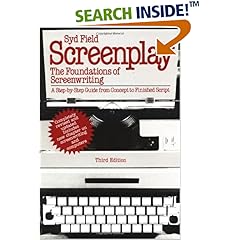 I started pretty much where all writer's start. When I was still in my teens, I turned to Syd Field. This book will introduce you to the basic structure of movies that you're probably already familiar with: The first ten minutes have to hook an audience. Usually the first half hour is the first act. Then a plot point comes and turns the action in another direction. Then the character spends the second act facing obstacles. The a second plot point spins the action around again. Then our third act. Conflict equals drama, and if a scene doesn't reveal information or move the story forward, it doesn't belong in the script. I just saved you all ten bucks.
I started pretty much where all writer's start. When I was still in my teens, I turned to Syd Field. This book will introduce you to the basic structure of movies that you're probably already familiar with: The first ten minutes have to hook an audience. Usually the first half hour is the first act. Then a plot point comes and turns the action in another direction. Then the character spends the second act facing obstacles. The a second plot point spins the action around again. Then our third act. Conflict equals drama, and if a scene doesn't reveal information or move the story forward, it doesn't belong in the script. I just saved you all ten bucks.Syd Field - The Screenwriter's Problem Solver
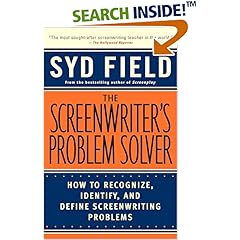 Next I moved onto his problem solving book. This one offered more insight into developing a good lead character, and offered solutions to typical problems in screenwriting. It's been nearly a decade since I've read it, but I remember this one being very useful for my writing. If I recall correctly, this book also spends some time summarizing his first book, so maybe other people can skip right to this one. However, a lot of the material is repetitive and as a result, somewhat boring. Field loves to hammer his points into his readers' heads, and that tends to get annoying.
Next I moved onto his problem solving book. This one offered more insight into developing a good lead character, and offered solutions to typical problems in screenwriting. It's been nearly a decade since I've read it, but I remember this one being very useful for my writing. If I recall correctly, this book also spends some time summarizing his first book, so maybe other people can skip right to this one. However, a lot of the material is repetitive and as a result, somewhat boring. Field loves to hammer his points into his readers' heads, and that tends to get annoying.Syd Field - Selling a Screenplay: The Screenwriter's Guide to Hollywood
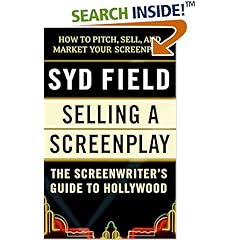 Maybe I was at the wrong place in my life to be reading this Field book, but I found it to be the least useful so I did not complete it. I think I got about three chapters in. Also, by this time, I grew sick of Field's writing style. Granted, this book provided much different material than the previous two. Still, I felt I needed more than what Field was offering. It's important to get different theories from different writers. You'll find that many of them disagree with each other, but you'll also be able to get a feel for your own style using components of all of theirs. I'm not going to recommend this book. Not now, anyways.
Maybe I was at the wrong place in my life to be reading this Field book, but I found it to be the least useful so I did not complete it. I think I got about three chapters in. Also, by this time, I grew sick of Field's writing style. Granted, this book provided much different material than the previous two. Still, I felt I needed more than what Field was offering. It's important to get different theories from different writers. You'll find that many of them disagree with each other, but you'll also be able to get a feel for your own style using components of all of theirs. I'm not going to recommend this book. Not now, anyways.David Trottier - The Screenwriter's Bible: A Complete Guide to Writing, Formatting, and Selling Your Script
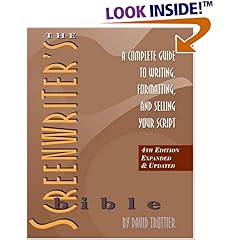 Highly highly highly recommended. In this one book, Trottier goes over the material of all three of the previous books I mentioned, and then some. He addressed the real questions a writer will have; even the little ones like "What type of paper should I use?" This was the most useful book I have ever read, and I still find myself turning to it from time to time. My copy is near destroyed because I've taken it with me wherever I've gone over the years. Trottier is a great teacher, and he also has a small column in Scr(i)pt magazine, which we'll get to later. But let me make this clear: if you fancy yourself a screenwriter, you need this book.
Highly highly highly recommended. In this one book, Trottier goes over the material of all three of the previous books I mentioned, and then some. He addressed the real questions a writer will have; even the little ones like "What type of paper should I use?" This was the most useful book I have ever read, and I still find myself turning to it from time to time. My copy is near destroyed because I've taken it with me wherever I've gone over the years. Trottier is a great teacher, and he also has a small column in Scr(i)pt magazine, which we'll get to later. But let me make this clear: if you fancy yourself a screenwriter, you need this book.Alex Epstein - Crafty Screenwriting: Writing Movies That Get Made
 A few years went by where I'd study up on writing for other forms (such as radio and television). During that time, I wrote a nice handful of short screenplays and made them in college. After I graduated, it was time to move on to more serious work. This book was a nice refresher for some of the basic writing elements, but from a new point of view. The thing is, though, you can tell that the author is slightly bitter about how things worked out for him. He had a script, went through some hell, didn't get it made, and then put it in the second half of this book. It's an okay script, but it's not really the huge masterpiece you'd expect from an author on writing. That said, you can probably skip this one.
A few years went by where I'd study up on writing for other forms (such as radio and television). During that time, I wrote a nice handful of short screenplays and made them in college. After I graduated, it was time to move on to more serious work. This book was a nice refresher for some of the basic writing elements, but from a new point of view. The thing is, though, you can tell that the author is slightly bitter about how things worked out for him. He had a script, went through some hell, didn't get it made, and then put it in the second half of this book. It's an okay script, but it's not really the huge masterpiece you'd expect from an author on writing. That said, you can probably skip this one.Lloyd Kaufman - Make Your Own Damn Movie!: Secrets of a Renegade Director
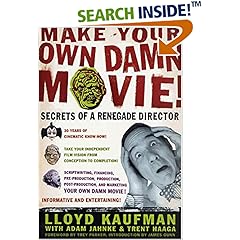 By this point I had made up my mind: I'm not going to try and sell a screenplay...I'm going to film my screenplay on my own. This was a scary notion, but also a liberating one. I found this book to be surprisingly useful. I can't say I'm a huge Troma fan or that I'm very familiar with these films, but that's not really what the book's about. Through personal stories and decades of experience, Kaufman teaches you how to embrace low-budget filmmaking. He'll show you how to turn the negatives into positives, and how to really work with the little you've got. If you're going to go out there and make a movie on your own, I highly recommend this book.
By this point I had made up my mind: I'm not going to try and sell a screenplay...I'm going to film my screenplay on my own. This was a scary notion, but also a liberating one. I found this book to be surprisingly useful. I can't say I'm a huge Troma fan or that I'm very familiar with these films, but that's not really what the book's about. Through personal stories and decades of experience, Kaufman teaches you how to embrace low-budget filmmaking. He'll show you how to turn the negatives into positives, and how to really work with the little you've got. If you're going to go out there and make a movie on your own, I highly recommend this book.How to a movie for under $10,000 "and not get arrested"
I'm not finding a link for this one, so maybe I didn't get the title exactly right. Like Kaufman's book, this one teaches you how to embrace low-budget filmmaking. However, it seems to severely oversimplify some major areas of importance. Still, it breaks down a lot of the work that goes into a movie and helps you plan what you'll need and what you can get away without. I recommend it.
Drew Yanno - The Third Act: Writing a Great Ending to Your Screenplay
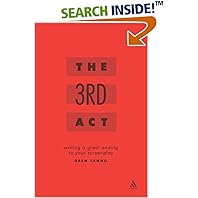 This is one I'm still absorbing. As you can read from my last blog entry, I found it very useful for the project I'm working on. It helped me fine tune some of the structure, and it re-enforced the importance of a strong dramatic need. This books is also a very quick read. I knocked most of it off in one plane trip from California to New York. It likes to constantly draw from the same seven films, so if you pick this book up and you're not familiar with those films, you might be a little screwed. Still, this book could not have been given to me at a better time, and I recommend it for people that constantly start things they can't seem to finish.
This is one I'm still absorbing. As you can read from my last blog entry, I found it very useful for the project I'm working on. It helped me fine tune some of the structure, and it re-enforced the importance of a strong dramatic need. This books is also a very quick read. I knocked most of it off in one plane trip from California to New York. It likes to constantly draw from the same seven films, so if you pick this book up and you're not familiar with those films, you might be a little screwed. Still, this book could not have been given to me at a better time, and I recommend it for people that constantly start things they can't seem to finish.Scr(i)pt Magazine
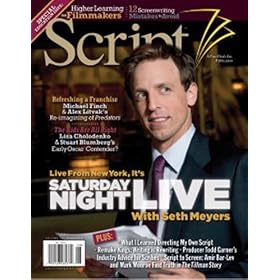 There are some major pros and cons associated with this magazine. First the good: it's always up to date, and you get to read articles written by real screenwriters...people that have actually had major success with the stuff they've written. It has a monthly column by David Trottier, whom I mentioned earlier is just a great teacher. And, the magazine gives you a great inside look into the most current movies. Now for the bad: every other page is an ad for some type of writing software or seminar. The sad truth is, there is no secret for success as a screenwriter, so I fear these ads take in too many people with their false promises (I don't use Final Draft. I use a free template on Microsoft Word, and it works great). Also, the magazine likes to spend a lot of time on what works in writing, but not a whole lot in what doesn't work. Last, it's expensive to have a subscription. Still, it's worth having.
There are some major pros and cons associated with this magazine. First the good: it's always up to date, and you get to read articles written by real screenwriters...people that have actually had major success with the stuff they've written. It has a monthly column by David Trottier, whom I mentioned earlier is just a great teacher. And, the magazine gives you a great inside look into the most current movies. Now for the bad: every other page is an ad for some type of writing software or seminar. The sad truth is, there is no secret for success as a screenwriter, so I fear these ads take in too many people with their false promises (I don't use Final Draft. I use a free template on Microsoft Word, and it works great). Also, the magazine likes to spend a lot of time on what works in writing, but not a whole lot in what doesn't work. Last, it's expensive to have a subscription. Still, it's worth having.Over the years I've also spent a lot of time reading screenplays. This is a huge help in making movie-structure a second nature. If you're a screenwriter-in-the-making, I recommend you read the spec scripts to your favorite films whenever you can. And when you watch a movie, pay close attention. Make note of things like how far in until the first plot point occurs, what the conflict is, and so on. Then, write. Practice practice practice. As Syd Field writes (a thousand times per book), writing is rewriting.
So that's where I'm coming from. No film school for me, but a lot of background on writing. Creative writing, writing for advertising, and so on. But I get no greater thrill than that first script read with the cast: a bunch of people sitting in a circle reading my words. I can't wait to have that again. 'Till next time!

2 comments:
I have that book by Kaufman.
I thought it was a good read but not as helpful as I thought it would be for actual ways to make a movie.
I thought that Bruce Cambell's book "If Chins Could Kill" was awesome. It has a great fake blood recipe and cool low budget effects from Evil Dead.
lloyd of all people!
Post a Comment